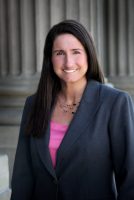Rep. Ted Hill faced a barrage of questions Wednesday before the House advanced his bill that would allow school staff to carry guns on the job.
Ultimately, the House overwhelmingly supported the bill. Backers argued it would give teachers a chance to protect their classrooms in the minutes before police respond to a school shooting.
“This chasm of vulnerability, this gap, is something we can’t close,” Hill, R-Eagle, said during a lengthy debate. “We just have to give these people the opportunity to defend themselves.”

The National Rifle Association-backed legislation would grant school employees — from teachers to secretaries to bus drivers — the right to carry guns on public school campuses, as long as they have an enhanced concealed weapons permit.
Fifty-three House Republicans voted to approve House Bill 415. Five Republicans joined the 11 Democrats in the House to oppose it.
Hill spent much of Wednesday’s debate answering questions, particularly about training, liability and local control. Many lawmakers were skeptical of ceding local school board authority to regulate staff firearms.
That was a deal-breaker for Rep. Jack Nelsen, R-Jerome, who said he otherwise “loves the intent of the bill.” Nelsen, and others, noted that districts currently allowing guns on campus have stricter vetting and training requirements.
“It cuts those guys off at the knees,” Nelsen said.
To get an enhanced concealed carry permit, applicants must complete eight hours of classroom training and fire a minimum of 98 practice rounds. Law enforcement officials have said that may not be adequate, and even if it was, there’s no recurring training requirements. Under the bill, school leaders could not mandate additional training than what’s already required to get the permit.
During a committee hearing last week, Hill said it’s “irrelevant” whether school trustees know who’s carrying a gun. And he’s brushed aside calls for more training. Most people carrying firearms at school will probably be “proficient,” he said Wednesday.
“They’re going to be comfortable — probably hunters,” Hill said. “People are concerned about the training, I am not.”
And supporters of the bill argued Wednesday that it’s up to an individual teacher to decide how they protect themselves and their students.
“That is our constitutional right,” said Rep. Josh Tanner, R-Eagle. “We’ve somehow segmented an area where we’ve got vulnerable kids and expected these teachers to deal with a potential massive situation without anything to protect themselves or the kids.”
A few Republicans appeared to have grave anxieties about the bill but ended up supporting it. Before casting a green light, Rep. Mark Sauter, R-Sandpoint, said he had “real concerns.”
“This just begs for continuous and consistent and some pretty detailed training,” Sauter said. “That’s what I was really looking for, and I’m not seeing that.”
Democrats, on the other hand, slammed the bill. House Minority Leader Ilana Rubel, of Boise, suggested it’s motivated by an action-movie “fantasy,” wherein a good guy takes down a bad guy. But more often than not, accidents happen, like someone misplaces a gun or has bad aim, Rubel said.
“There are an awful lot of things that can go wrong in this situation,” she said.

House Bill 415 now heads to the Senate. As it advances, there remains some unsettled questions about a provision that would protect school employees from legal liability.
Rep. John Gannon, a Democrat from Boise and an attorney, said the bill would grant broad immunity from liability “whether you use the gun, don’t use the gun, whether you hit the wrong object or a person.”
But Hill said the liability provision only applies to the decision to engage or not engage in a gunfight. “Once you engage, you have the same liability and responsibility as anybody else,” he said. “If you shoot, you are responsible for what you shoot, just like everyone else.”
New bill would create State Board regions
State Board of Education members would be appointed by geographic region under a new bill introduced Wednesday.
Historically, there’s been an “informal understanding” that the board would have statewide representation, but there have been “ebbs and flows” in following that standard, said Republican Rep. Britt Raybould, of Rexburg.
Raybould’s bill would create seven regions for the seven-member State Board. The governor would continue to appoint board members but each appointee would have to be a resident of one of the regions.
The bill comes amid a push to require elections for the State Board. Last year, a bill to require regional elections to the board narrowly failed in the House. Raybould’s proposal is a “reasonable response” to the concerns motivating that push and would “negate the need for elections,” she told the House Education Committee.
When drawing the region boundaries, recognizing school district boundaries and maintaining roughly equivalent populations were priorities, Raybould said. But she recognized that would be an “imperfect system.”
If approved, the bill would assign current board members a region — not necessarily related to their residency — and allow them to finish their terms. Subsequent appointments would have to abide by the geographic requirements. State Board members serve five-year terms.
